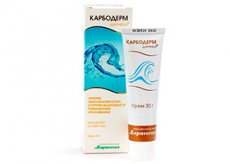Medical expert of the article
New publications
Preparations
Carboderm
Last reviewed: 04.07.2025

All iLive content is medically reviewed or fact checked to ensure as much factual accuracy as possible.
We have strict sourcing guidelines and only link to reputable media sites, academic research institutions and, whenever possible, medically peer reviewed studies. Note that the numbers in parentheses ([1], [2], etc.) are clickable links to these studies.
If you feel that any of our content is inaccurate, out-of-date, or otherwise questionable, please select it and press Ctrl + Enter.

Carboderm is a local dermatological drug that has an intense hydrating, antipruritic and keratolytic effect. Along with this, the drug has some antifungal and antibacterial effects.
The use of LS allows to reduce the severity of hyperkeratosis development in the patient, increase the elasticity of the epidermis and soften it, and at the same time stabilize the ongoing epithelialization processes in case of damage to the surface of the epidermis.
Indications Carboderma
It is used in dermatology, in people with diseases during which excessive formation of keratinized particles of the epithelium is observed.
A 5% cream is prescribed in cases of lichenified eczema (chronic stage), non-exudative types of psoriasis, as well as neurodermatitis and atopic dermatitis.
A 10% solution of the medicine is used in cases of seborrhea, keratomycosis, psoriasis with ichthyosis and hyperkeratotic varieties of eczema.
Release form
The medicinal component is released in the form of 5% and 10% cream, inside 30 g tubes. The box contains 1 tube of cream.
Pharmacodynamics
The 10% form of the cream helps to destroy fungi and bacteria (has a fungicidal and bactericidal effect), the 5% form helps to reduce the rate of their development and growth (fungistatic and bacteriostatic effect).
Urea has some local anesthetic effect, which allows the development of the antipruritic activity of Carboderm.
Due to the presence of high-molecular bonds, which are the basis of the medication, systemic absorption of urea is prevented.
Dosing and administration
The medicine is used for local application to the epidermis.
The medication should be applied only to the affected areas of the epidermis; it is prohibited to apply it to healthy areas of the skin. Before treatment, the area of application must be washed and dried.
The drug can be applied under a tight dressing and used during phonophoresis (but only the 5% form). The duration of the course and the dosage of urea are selected by the doctor.
Basically, 1-4 cm of medicine is applied twice a day.
Therapy usually lasts 1-2 weeks, but the attending physician may extend the course taking into account the intensity and nature of the pathology.
 [ 1 ]
[ 1 ]
Use Carboderma during pregnancy
The attending physician may prescribe Carboderm during pregnancy or breastfeeding.
Contraindications
Contraindicated for use in people with severe intolerance associated with the components contained in the medication.
The cream is not prescribed for dermatoses that are accompanied by the formation of large volumes of exudate.
Side effects Carboderma
The medication is generally tolerated by patients without complications. However, when using it, signs of allergy may occur - itching, epidermal hyperemia and urticaria.
Sometimes tingling and burning sensations occur in the area where the cream is applied. The likelihood of these disorders occurring is higher if an airtight dressing is applied to the area of application.
Storage conditions
Carboderm must be stored at temperatures no higher than 25°C.
Shelf life
Carboderm is approved for use within a 2-year period from the date of manufacture of the therapeutic substance.
Application for children
The cream is not used in pediatrics, because its therapeutic effect in this group of patients has not been studied.
Analogues
An analogue of the drug is the drug Uretop.
Attention!
To simplify the perception of information, this instruction for use of the drug "Carboderm" translated and presented in a special form on the basis of the official instructions for medical use of the drug. Before use read the annotation that came directly to medicines.
Description provided for informational purposes and is not a guide to self-healing. The need for this drug, the purpose of the treatment regimen, methods and dose of the drug is determined solely by the attending physician. Self-medication is dangerous for your health.

